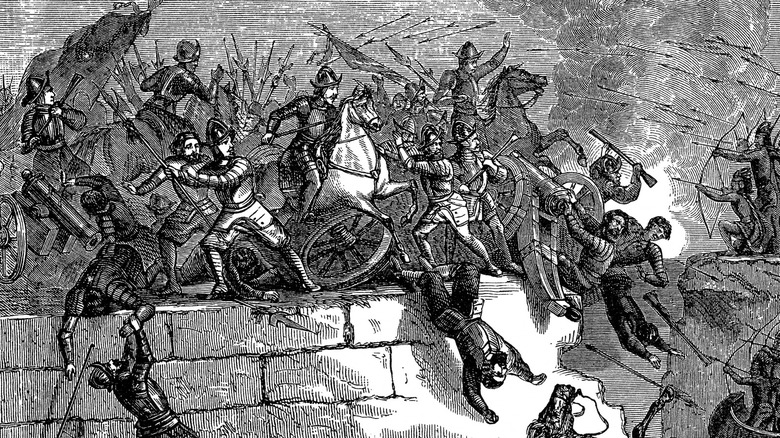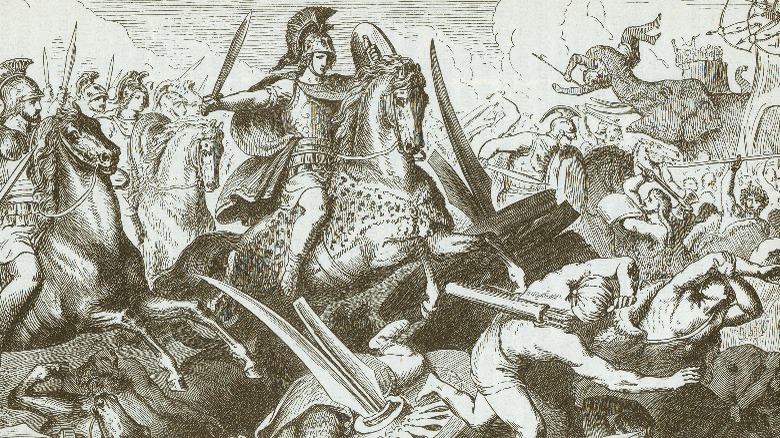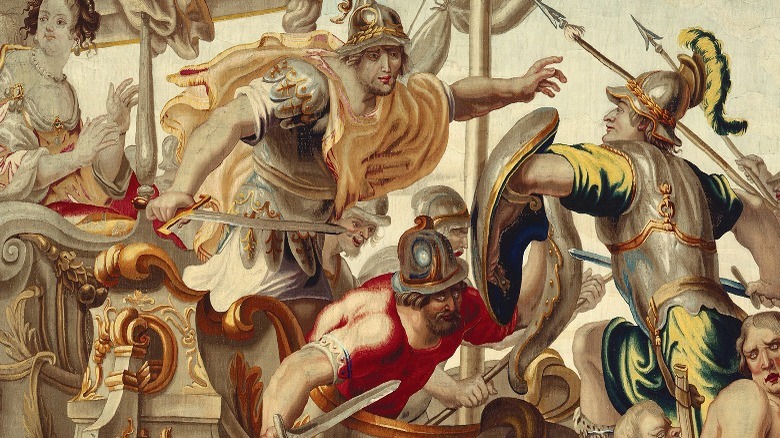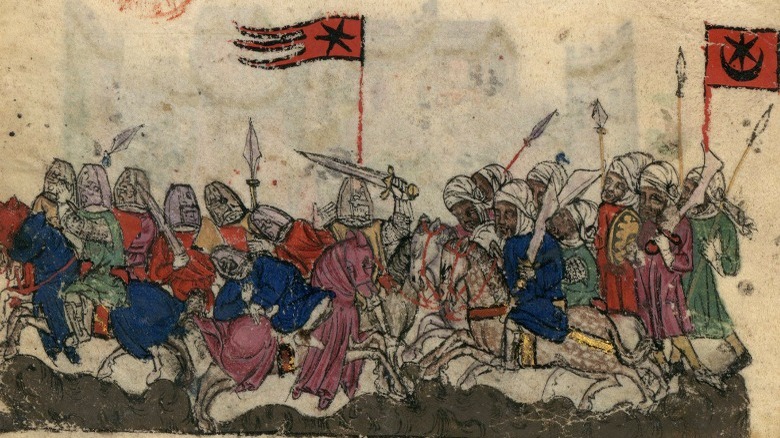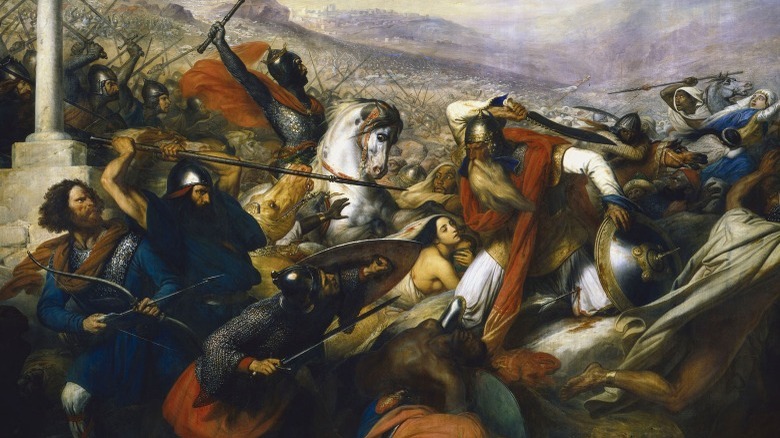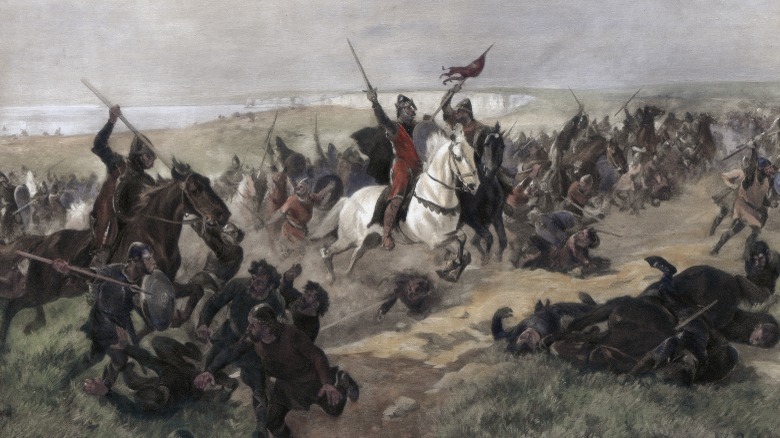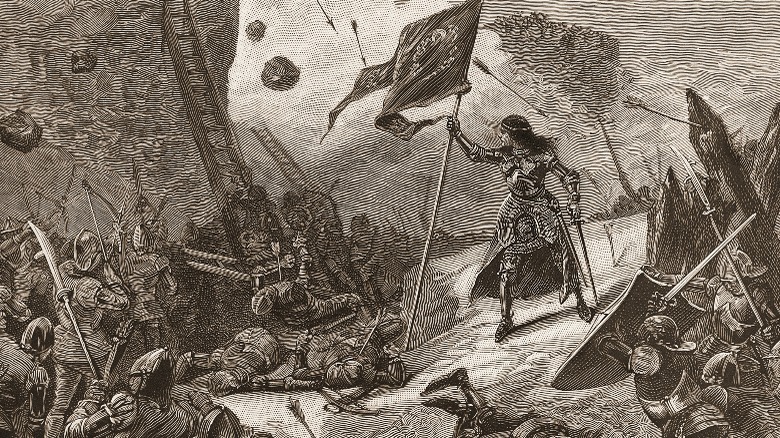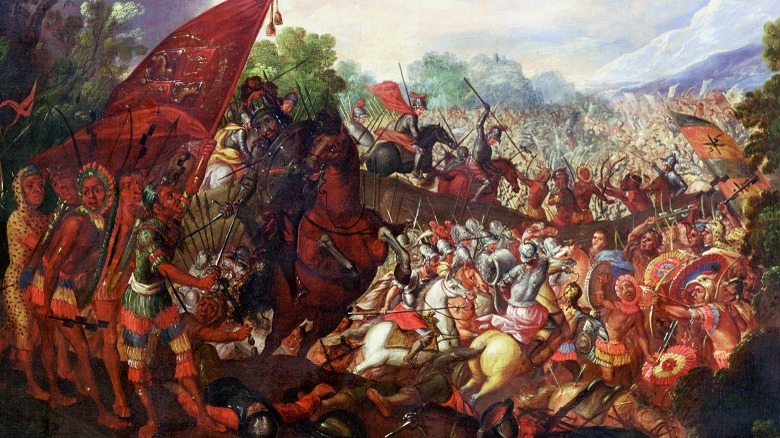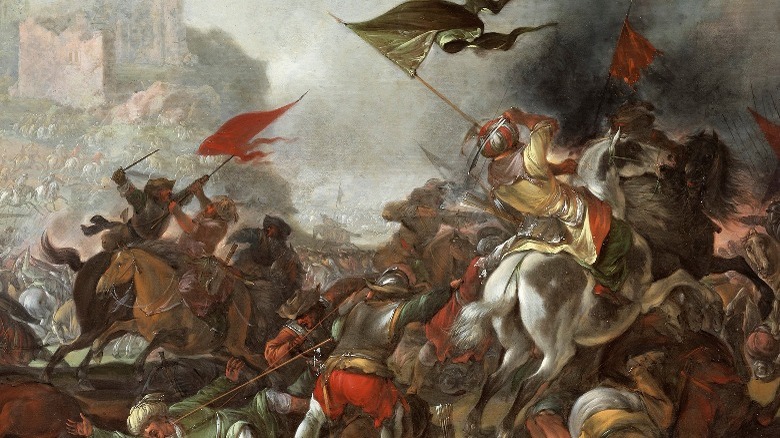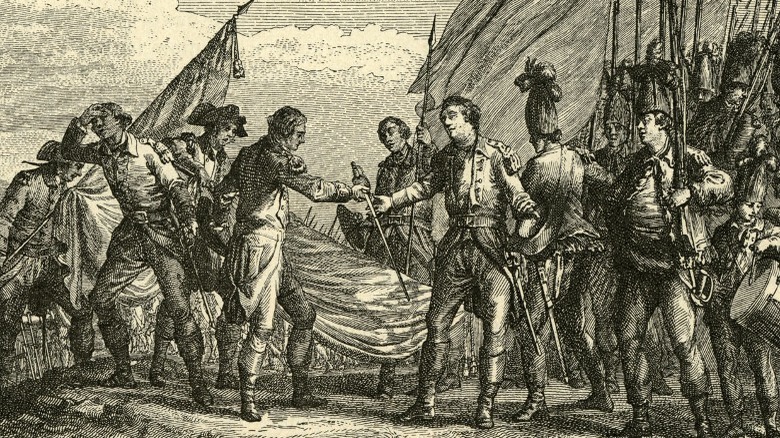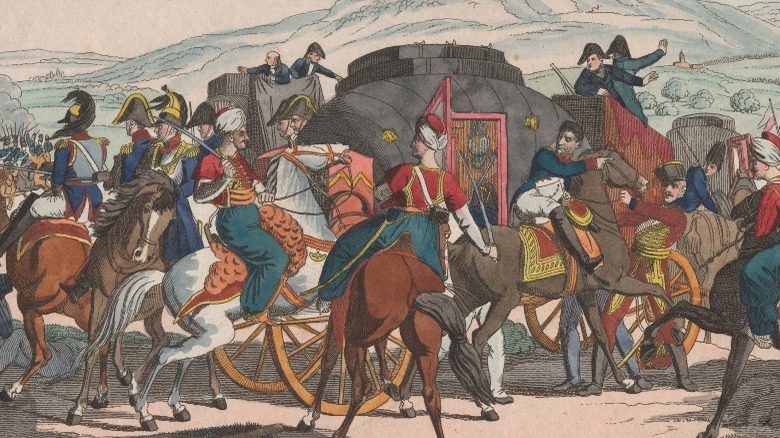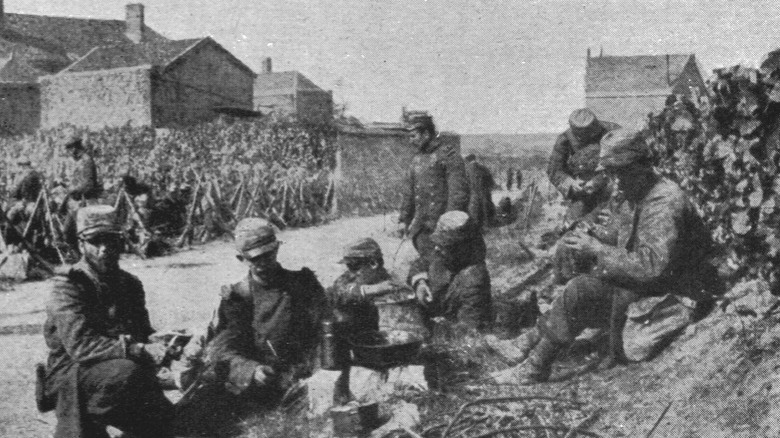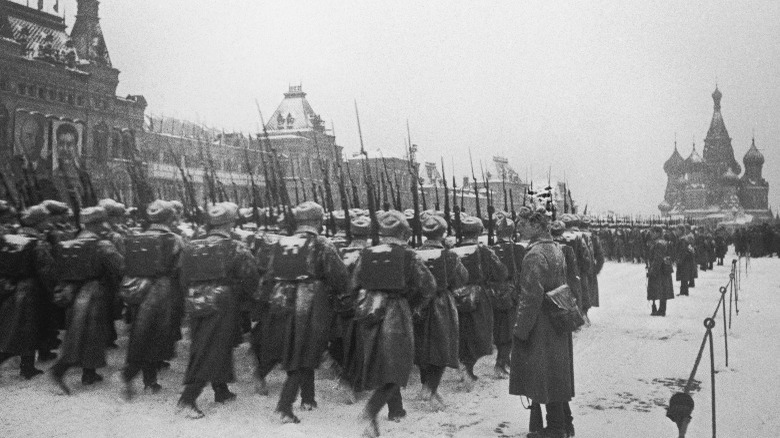Battles That Changed The Course Of History
Throughout history, few things have shaped the world like wars. From the blood-soaked clashes of ancient armies using primitive handcrafted weapons, to the highly computerized drone warfare of today, the human urge to fight has long been a part of society. Many of the biggest names in history owe their stature to their ability to lead armies into war, and some of history's greatest leaders have also been some of its finest warriors.
Yet, even though wars may go on for years, decades, or even centuries at a time, it's always the individual battles that determine how things will end up, and sometimes they can have devastating consequences for civilizations. In addition, many key battles have allowed for the expansion of empires to new lands and continents, changing cultural dynamics in dramatic ways.
From the times of Alexander the Great to the modern fighting of the 20th century, countless battles have permanently altered our way of life. Looking back, these are some of the most important battles that changed the course of history.
The Battle of Gaugamela
Undoubtedly, one of the most important and studied kings in history is Alexander the Great. His reign as the king of Macedonia lasted just over a decade, but his impact remained far past his death in 323 B.C. One of the most significant battles of Alexander's career came in the early years of his reign, in 331 B.C. This was the famous Battle of Gaugamela, which is also known by some as the Battle of Arbela.
Alexander was born in 356 B.C. and became king in 336 B.C. after the assassination of his father, Philip II. After putting down internal rebellions in Macedonia, Alexander sought to continue his father's legacy of expanding the empire into Asia. He and the Greek army attacked the giant Achaemenid Persian Empire under Darius III at Granicus and Issus, and also conquered Egypt on the African continent. By 331 B.C., Alexander was ready to take on the Persians under Darius at Gaugamela.
With roughly 20% of the force that Darius had, Alexander was able to defeat Darius and the Persians during the battle, using superb tactics but also sacrificing many of his own men. This battle not only strengthened the Greeks, who then pushed across the Asian mainland all the way to India, but also spelled the end of the Persians. Darius was killed and Alexander took over as king of his Achaemenid empire, forever changing the landscape of Asia.
The Battles of Actium and Teutoburg Forest
In terms of Western history, few imperial powers were as important as ancient Rome. Ancient Rome lasted for more than a millennium and included the regal period, the Roman Republic, and the Roman Empire, and is almost unrivaled in its impact on Western culture and thought. One of the most significant periods of ancient Rome was the switch from the Roman Republic to the Roman Empire around the turn of the first millennium. This was due to a great victory by Octavian, later known as Augustus, in 31 B.C. at the Battle of Actium.
The battle was set up by the death of Julius Caesar 13 years prior, which had kicked off a power struggle for control of Rome. Though there was a ruling triumvirate consisting of Mark Antony, Octavian, and Lepidus, they fought amongst each other, which led to the armies of Antony and Octavian facing off at Actium in 31 B.C. Octavian's victory split Anthony and his lover Cleopatra and led to their deaths, which allowed Octavian to consolidate power. He then took the name Augustus and became the first Roman emperor.
Augustus would reign for several decades until A.D. 14, but just before his death another very important battle for ancient Rome played out: the Battle of Teutoburg Forest in the year 9. The Romans under Augustus fought Germanic tribes led by Arminius, which ended in a severe Roman defeat. It curtailed Augustus' expansion east, keeping Germania free from expanding Roman influence.
The Battle of the Yarmouk
For Islamic history, one of the most formative early events was the Battle of the Yarmouk. It ended with a Muslim victory against the Byzantines, largely thanks to the leadership of Khalid ibn al-Walid, a great early Muslim commander. Following the death of the Prophet Muhammad in 632, Muslim warriors had continued his legacy of the expansion of Islam. Moving north, Muslims of the Rashidun Caliphate under the command of Khalid found themselves invading the Levant, which was then under the control of the Roman Byzantine Empire.
Pushing back, the Byzantine armies met the Muslims at the Yarmouk River in Syria, with a force roughly twice the size of the Arabs. Even though they were outnumbered, the Arabs were able to defeat the Byzantine armies' relentless attacks, with Khalid's superior tactical skills making a crucial difference. The Muslim cavalry proved decisive, crushing the Byzantines and securing the entire area for Islam.
Unfortunately for Khalid, the Rashidun Caliph Umar usurped most of the accolades for the victory, though Khalid's name would be rehabilitated with time. The victory at Yarmouk essentially gave the Muslims unfettered access through the Levant, which would quickly result in the surrender of the holy city of Jerusalem. Without a victory at Yarmouk, the expansion of Islam would not nearly have been as rapid, and the map of West Asia would look very different than it does today.
The Battle of Tours
As far as Western Europe is concerned, the Battle of Tours (or Battle of Poitiers) in 732 is certainly one of the most important in history. The battle saw the Franks under Charles "The Hammer" Martel fighting to defend their homeland, which was under attack. The perpetrators of the attack were the rapidly expanding Umayyad Caliphate, and they were looking to push even farther into Western Europe from what is now Spain. Though based all the way back in Syria, the Umayyad Caliphate had quickly conquered territory across North Africa following their founding in the seventh century, which soon allowed them access to Spain and thus Europe.
In contrast, the Franks had been around since the fifth century and had come to prominence under the Christian Merovingian Dynasty. The two armies met at Tours in 732, and had roughly the same strength, though the Muslims may have slightly outnumbered the Christians. Due to the brilliant leadership of Martel, the Franks took the victory that day, but the battle had consequences that stretched far beyond the battlefield.
Many people argue the battle is what stopped the Muslim invasion of Western Europe, preserving it for Christianity. Its importance may be exaggerated by some, as the Muslims did try other conquests after Tours, but the battle in 732 was still decisive and did, at least for a time, firmly stop the Umayyad expansion in its tracks. Who knows what France would be like today had there been Umayyad rulers.
The Battle of Hastings
The Battle of Hastings in 1066 was by far one of the most monumentally important battles in English history. Though it only lasted a single day, the end result was the death of an English king and the crowning of a Norman as the new king of England. Leading up to the battle was a dispute over who was to succeed English King Edward the Confessor, who had died in early 1066. Both Harold Godwinson and William the Conqueror claimed the throne was theirs, but it was Harold who was crowned.
This led William, a Norman, to initiate an invasion of England in September. William's Norman army trounced King Harold II's army, and within months William was the new king of England. It's hard to imagine just how enormous a shift this was at the time, as England had been under Anglo-Saxon rule for hundreds of years, since the fifth century. The Normans would go on to rule for nearly a century themselves, before the Angevin Dynasty would take over in the mid-12th century.
In addition to changing the dynastic line of England, the Norman Conquest also had fundamental impacts on the culture and especially the architecture of England. The Normans built structures out of stone instead of wood, and they transformed the English countryside with their new construction.
The Siege of Orléans
The name Joan of Arc is one of the most famous in history, and much of her stature comes because of her actions during the Siege of Orléans in 1429. The battle took place near the end of the Hundred Years' War between France and England, and many consider it to be a crucial turning point. By this point in the war, the English were beginning their advance through France, even going as far as to crown their king's infant son as the new king of France.
Joan was just a baby when the English invasion of France started, and by the time she was a teenager it was beginning to hit high gear. Believing she was on a spiritual mission, Joan was able to convince the real king of France, Charles, of the same. He sent her to Orléans, which had already been the site of an English siege for months and seemed futile. However, within weeks she was able to completely turn the tide of the battle, forcing the English to retreat.
Though Joan herself would soon be burned at the stake, the battle proved to have a huge impact on the Hundred Years' War. It helped France to stave off an English invasion and regain much of its lost territory, allowing it to become powerful once again and avoid losing the war, which would have been much closer if Orléans had fallen.
The Siege of Tenochtitlan
A relic of centuries past, the Aztecs are one of the most fascinating people in history. It's not entirely clear where their ancestors are from, but it's thought the Aztecs came to power in the 15th century in what is now southern Mexico. At one point, their civilization numbered in the millions and was one of the greatest in Indigenous American history, but things came to a brutal end following the conquest of the Spanish.
The Spanish, as part of their exploration of the New World under conquistador Hernán Cortés, overpowered the Aztec civilization during the famous Siege of Tenochtitlan in 1521. Tenochtitlan was the Aztec capital, and when Cortés arrived, he met the Aztec ruler Montezuma and imprisoned him. This, in addition to other violent actions by the Spanish, led to an Aztec revolt that briefly halted the Spanish conquest, but the damage had already been done.
Along with their superior weapons, the Spanish also brought with them an unknown lethal element: smallpox. Smallpox devastated the Aztec population, and combined with the 93-day Siege of Tenochtitlan, left the entire area vulnerable to Spanish conquest. As expected, the Spanish slaughtered untold numbers of Aztec people and destroyed their empire. This was the beginning of the end for one of the most incredible empires in Mesoamerican history, and another casualty of Spanish conquest in the New World.
The Fall of Constantinople
Constantinople. Just the name conjures up images of ancient armies, important religious services, and the apogee of the Byzantine Empire. The Byzantines, or Eastern Roman Empire, made Constantinople their capital, and it stood as a symbol of the greatness of their civilization for over 1,000 years until its fall in 1453. The Ottoman Empire had been attacking the city for 60 years by that point, and at Constantinople in 1453, 60 to 80,000 Ottomans took on just 5,000 Roman soldiers.
Under the command of Mehmed II and with high-powered and innovative cannons on their side, the Muslims blasted the city to bits for nearly two months. Though the Romans did the best they could to hold out, eventually the city fell after the Ottomans finally breached the outer walls. This left the city wide open to the invading Muslim forces, who murdered countless numbers of defenseless Romans.
Not only was this a blow for the city, but it also essentially meant the destruction of the Byzantine Empire. With their capital now in Ottoman hands and their emperor, Constantine XI, dead, the Byzantines were powerless to stop the Muslim march into Europe. The Siege of Constantinople changed the landscape of Europe forever as it briefly came under the control of Muslims rulers. This lasted all the way until the Siege of Vienna in the late 17th century, when the Muslims were eventually pushed back.
The Battle of Saratoga
Of the many battles in the American Revolutionary War, perhaps the most important was that of Saratoga, which ended on October 7, 1777. Many people point to Yorktown as the essential battle of the revolution, but without the American victory at Saratoga, Yorktown may not have happened. Two years into the revolution by 1777, the Americans had yet to gain the upper hand on the British. Dug in and expecting an attack from Gen. John Burgoyne's troops, the colonists under Gen. Horatio Gates actually enjoyed a troop advantage of more than 2:1 against the British at Saratoga.
The British attack was a complete failure from the beginning, as the outmanned British and their Hessian allies were unable to accomplish practically anything. A month after first engaging the colonists, the British were forced to surrender due to a lack of supplies. Burgoyne was supposed to be reinforced by forces from Gen. Henry Clinton, but they never came, leaving Burgoyne no choice but to give up.
Not only was the battle a huge military victory for the colonists, but it also had astronomical political implications. The victory at Saratoga brought the French firmly to the American side, and they entered the war against their longtime rivals, the British. France's support was the decisive factor in the Americans winning the war, and it was largely thanks to Saratoga.
The Battles of Valmy & Waterloo
For many historians, the French Revolution is the most important event in modern history. It began in the 1780s, and by the early 1790s the revolutionaries were ready to expand outside of France, but they met opposition from their neighbors. At the Battle of Valmy in 1792, the French defeated the Prussians and stopped their onslaught, which completely turned the tide of the war. After Valmy, the French were on the offensive, and they finally began to export the revolution outside of France.
Valmy was the most important of the early battles of the Revolutionary Wars, and a few years later Napoleon would rise to power after the abolishment of the monarchy. Napoleon continued to push the French empire to other countries in Europe, but following his failures in Russia and at Leipzig, he was infamously exiled to the island of Elba. However, Napoleon escaped his lax confinement and quickly regained his power, setting up the Battle of Waterloo in 1815.
At Waterloo, the French met the British and Prussian armies, but could not budge them. The battle soon turned into a rout as the French retreated, and it marked Napoleon's final and most decisive defeat. The British victory at Waterloo led to Napoleon's final exile at St. Helena, where he died less than a decade later. Valmy and Waterloo serve as bookends of the Revolutionary and Napoleonic Wars, and in hindsight were some of the most momentous fights in history.
The First Battle of the Marne
If the First Battle of the Marne had gone differently, the modern landscape of Europe would probably look very, very different. After the German invasion of Belgium kicked off the First World War in August 1914, the German advance across Belgium into northern France was swift. With the German advance threatening the French capital at Paris, the First Battle of the Marne became one of the most important of the entire war.
The French under Gen. Joseph Joffre faced the Germans under Helmuth von Moltke, in a devastating and epic clash beginning on September 6. While the Germans had already been steamrolling the Allies for weeks, that came to a halt at the Marne. The French discovered a weakness in the German lines, and the 6th French Army exploited the hole to devastating effect. This completely split the German lines apart, allowing the French to stop them from uniting and pushing forward together.
With reinforcements being hurried to the front lines, the French were able to stop the German assault and save Paris from certain occupation. As a result of the First Battle of the Marne, the Germans' plan to quickly and decisively end the war was thwarted, leading to years of devastating warfare. Without the incredible French stand, Paris falls to the Germans, and the outcome of World War I looks very different.
The Battle of Moscow
While it's often the Siege of Stalingrad that gets most of the attention, the earlier Battle of Moscow may have been even more important for the outcome of WWII. The Battle of Moscow was part of the larger German Operation Barbarossa, which they began in the summer of 1941. Barbarossa was a surprise attack on the Soviet Union by Adolf Hitler and the Germans, and it inaugurated the Eastern Front of the war.
The Germans broke their peace treaty they had signed with the Soviets just two years prior, and the hope was the surprise attack would allow them to catch the Soviets off-guard and quickly destroy all of their forces. At first, the German gains were extraordinary, and by September they had reached Moscow. However, it was at Moscow that the German advance was halted in the face of increasing Russian resistance.
The German advance nearly forced Stalin to evacuate in mid-October, but it also caused many Russians to rally to the cause and defend Moscow. The Russians stood firm and forced the Germans back, and they had to abandon Barbarossa and retreat from Moscow in January 1942. Many argue that Barbarossa was the Germans' best chance to defeat the Soviet army, as it was their one opportunity to catch them off-guard. With the failure of Moscow, and thus Barbarossa, the Germans never found a better chance to win the war, and their next offensive into Stalingrad was just as big a failure.
